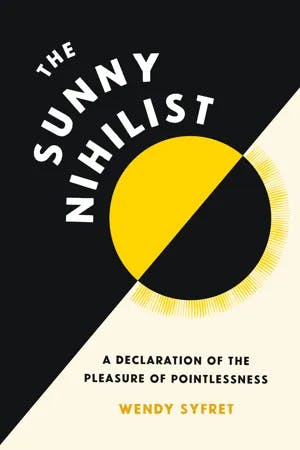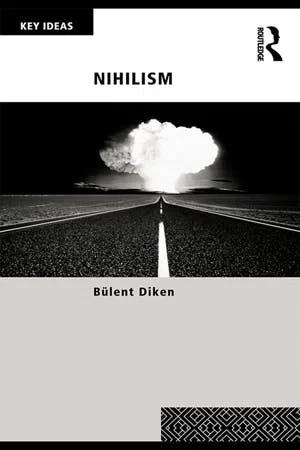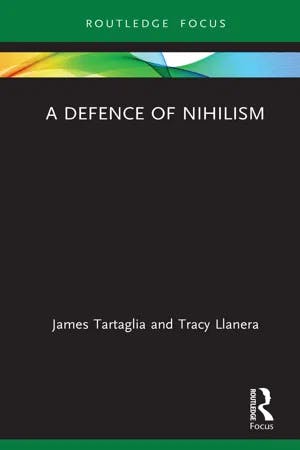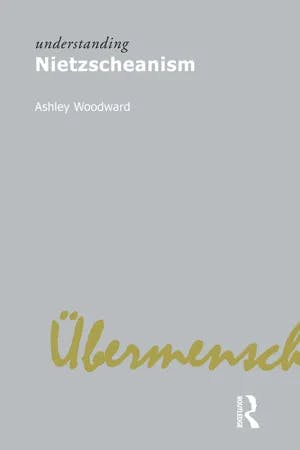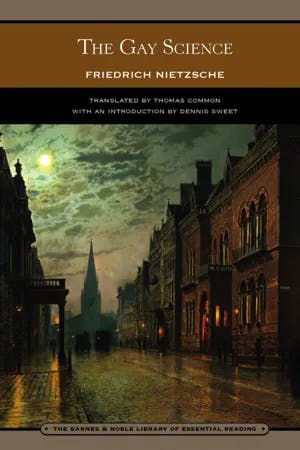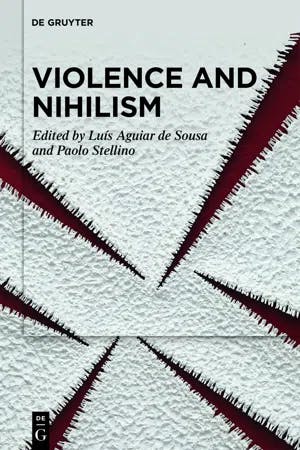What is Nihilism?
MSt, Women's, Gender & Sexuality Studies (University of Oxford)
Date Published: 02.11.2023,
Last Updated: 20.02.2024
Share this article
Defining nihilism
Nihilism, like existentialism, is a philosophical term you might hear in everyday contexts. Pop culture is filled with nihilistic characters, memes, and TV shows “about nothing.” Nihilism isn’t a synonym for pessimism or negativity; it is the belief that the world is meaningless: nothing matters. Wendy Syfret writes,
Nihilists (or at least the stereotype of them) believe meaning, values, and purpose don’t inherently exist. That they’re human-made constructs we willingly assemble to constrain and comfort ourselves. (2022)
Wendy Syfret
Nihilists (or at least the stereotype of them) believe meaning, values, and purpose don’t inherently exist. That they’re human-made constructs we willingly assemble to constrain and comfort ourselves. (2022)
The term “nihilism” comes from the Latin word nihil, meaning “nothing.” While the idea that “nothing matters” may seem simple enough, thinkers have disagreed on how exactly to define a philosophy of nothingness — and how to respond to a meaningless world. To some, nihilism is a nightmare; to others, a relief.
In this guide, we’ll track nihilism’s development,explore key thinkers, and define several types of nihilism.
Origins of nihilism
The search for meaning in life is a fundamental human quest. Early manifestations of nihilism can be traced to Buddhist beliefs in the impermanence of existence, and to the ancient Greek Skeptics’ denial of the attainability of true knowledge. Nihilism’s roots can also be found in the philosophies of Socrates and Plato. As Bülent Diken writes in Nihilism (2008), “Socrates judged life as an illness from which one can recover only by dying”:
Socrates is the first exponent of a long tradition of thought that stands in a negative relation to life. [...] In postulating rationality as the supreme principle of the world, he destabilized the ground on which values are created, that is, life. (2008)
Bülent Diken
Socrates is the first exponent of a long tradition of thought that stands in a negative relation to life. [...] In postulating rationality as the supreme principle of the world, he destabilized the ground on which values are created, that is, life. (2008)
Plato’s theory of the Forms, which views our world as the illusory shadow of a more perfect one, arguably edges toward nihilism: if true meaning lies elsewhere, is the world we live in still meaningful?
The term “nihilism” was coined by Friedrich Lebrecht Götze in De Nonismo et Nihilismo in Theologia (1733), in which he aimed to approach the world through a lens of nothingness. The eighteenth century saw scattered usage of “nihilism,” and James Tartaglia and Tracy Llanera write that an 1801 French dictionary defined a nihilist as,
‘One who does not believe in anything. A fine product of the evil philosophy that flaunts itself in the fat Dictionnaire encyclopédique’. [...] Digest all that learning and you’d end up not believing in anything (but believing lots of things): you’d end up a nihilist. (2020)
James Tartaglia & Tracy Llanera
‘One who does not believe in anything. A fine product of the evil philosophy that flaunts itself in the fat Dictionnaire encyclopédique’. [...] Digest all that learning and you’d end up not believing in anything (but believing lots of things): you’d end up a nihilist. (2020)
While nihilism gained traction in the eighteenth century, it came into its own in the nineteenth century. The Danish philosopher Søren Kierkegaard is sometimes associated with early nihilism. However, Kierkegaard never used the term and was more interested in “leveling,” a concept often inaccurately conflated with nihilism (especially “passive nihilism” [see below]). As Tartaglia and Llanera explain,
Kierkegaard was concerned about passion draining from modern life, which was becoming too trivial and superficial for his likings [...]. He saw life becoming too easy and people too wishy-washy, everything levelling-out to become uniformly unexceptional. (2020)
Kierkegaard writes that, “whereas a passionate age accelerates, raises up and overthrows [...], a reflective apathetic age does the opposite, it stifles and impedes, it levels”:
[L]eveling at its peak is like a deathly stillness in which a person can hear himself breathe, a deathly stillness in which nothing can rise up but everything sinks down into it, impotent. (2009)
Søren Kierkegaard
[L]eveling at its peak is like a deathly stillness in which a person can hear himself breathe, a deathly stillness in which nothing can rise up but everything sinks down into it, impotent. (2009)
In the 1860s, nihilism united Russian political radicals. Ivan Turgenev’s novel Fathers and Sons (1862) presented nihilism as a banner for political reform through its hero, Bazarov. Turgenev describes his self-proclaimed nihilist as,
a man who does not bow down before any authority, who does not take any principle on faith, whatever reverence that principle may be enshrined in. (1862, [2009])
Ivan Turgenev
a man who does not bow down before any authority, who does not take any principle on faith, whatever reverence that principle may be enshrined in. (1862, [2009])
Bazarov challenges traditional values by rooting knowledge in experience and scientific processes. The Russian nihilist movement rejected religious orthodoxy, state authority, and familial structures, and championed rationalism, materialism, and individual freedoms (including for women). The movement overlapped in part with the anarchism of Mikhail Bakunin. By the 1870s, the nihilist movement had deteriorated into destructive acts of terror and political assassinations before dissolving.
Nietzsche and nihilism(s)
The end of the nineteenth century welcomed the writings of the philosopher most associated with nihilism: Friedrich Nietzsche (1844–1900). Ashley Woodward writes in Understanding Nietzscheanism (2014),
While Nietzsche’s importance to modern thought cannot be reduced to a single idea or point of interpretation, if there is one over-arching theme that helps us to understand his tremendous influence, then arguably it is nihilism, the devaluation of the highest values of Western culture. (2014)
Ashley Woodward
While Nietzsche’s importance to modern thought cannot be reduced to a single idea or point of interpretation, if there is one over-arching theme that helps us to understand his tremendous influence, then arguably it is nihilism, the devaluation of the highest values of Western culture. (2014)
Nietzsche’s discussions of nihilism are core to his philosophy and legacy. However, Nietzsche’s understanding of nihilism is not clear-cut. His ideas evolve and contradict each other, and many still debate how to understand and interpret his concept of nihilism.
For Nietzsche, religion is born from nihilism. Confronted with a meaningless world, humans fail to accept that everything is “devoid of a goal, unity or meaning” and undertake,
an escapist attempt to be able to endure the meaninglessness, the chaos of the world, by trying to endow it with meaning, by imposing an illusionary totality upon it. [...] As such, the origin of nihilism is the invention of transcendent God, a supra-sensory realm beyond earthly life, a realm that contains a goal for the earthly life as well as determining it “from above” and “from without” [...]. (Diken, 2008)
In religious nihilism, “life here and now is devalued or negated and reduced to an ephemeral stage, a bridge to a more real existence” (Diken, 2008). In other words, religious nihilism sees our world as essentially meaningless because there is a better world beyond us, a “true” life without pain or conflict. Religious nihilism “negates this life, this world, by juxtaposing it to a heavenly, ‘true’ one” (Diken, 2008). Nietzsche names Christianity as a nihilistic religion.
Nietzsche’s most well-known idea may be his polemic declaration that “God is dead,” spoken by a madman in The Gay Science:
God is dead! God remains dead! And we have killed him! How shall we console ourselves, the most murderous of all murderers? (1882, [2009])
Friedrich Nietzsche
God is dead! God remains dead! And we have killed him! How shall we console ourselves, the most murderous of all murderers? (1882, [2009])
Nietzsche believes that God is functionally dead in the modern world. The death of God coincides with an inability to turn to religion to console ourselves in the face of meaninglessness, so Nietzsche believes we increasingly turn to forms of secular nihilism. We can call these two forms active or radical nihilism and passive nihilism:
The first insists on transcendence by taking the negation of this world to its logical extreme, the annihilation of the actual world; the second, becoming content with the actual world, gives up its ‘malignant’ properties: passions and values. (Diken, 2008)
In other words, active nihilism wills nothingness (often attempting annihilation of the world or the self) while passive nihilism annihilates the will. Diken summarizes radical nihilism as “values that cannot find a world” and passive nihilism as “a world without values” (2008).
Active or radical nihilism despairs at the flawed nature of the world; when these nihilists understand their values cannot be realized, they become spiteful and seek to destroy the world (and often themselves) instead. To illustrate this form of nihilism, Diken discusses Hans Magnus Enzensberger’s idea of the “radical loser,” a figure recognizable in fiction and in our society. Enzensberger writes,
The newspapers run stories on him every week: the father of two who killed his wife, his small children and finally himself. [...] Or the man who suddenly barricades himself in his apartment, taking the landlord, who wanted money from him, as his hostage. [...] A disparaging remark from a superior is enough to make the man climb a tower and start firing at anything that moves outside the supermarket, not in spite of but precisely because of the fact that this massacre will accelerate his own end. (“The radical loser", 2005)
The radical/active nihilist turns resentment into spiteful acts, merging destruction and self-destruction in pursuit of coming “as close as possible to the feeling of power, both over himself and others” (Diken, 2008).
Conversely, the passive nihilist surrenders to powerlessness. This nihilist rejects “values that belong to a supra-sensual world” — values worshipped by the religious nihilist — but does not replace them: “this life, significantly, remains a reactive life devoid of will” (Diken, 2008). Passive nihilists deny religion and values. Diken writes,
Whereas the ascetic suffers because of his will, the passive nihilist avoids suffering through the ‘narcotization’ of the will. His is a reactionary life, in which happiness is separated from action and reduced to passivity [...]. (2008)
For this nihilist, contentment is “a narcotic, a deadening, a quietude, a peace [...]—in short, a purely passive phenomenon” (On the Genealogy of Morals, Nietzsche, 1887, [2009]). The passive nihilist prefers to fade away into nothingness rather than bring about nothingness (as the active nihilist does).
For Nietzsche, both active and passive nihilisms are specific dangers of modern society. For the passive nihilist, there is nothing to be done but to give into the sedated, hedonistic passivity and oblivion modernity encourages, to cede true passion, desire, and meaning. For the active nihilist, faced with the “tranquillizing, passive existence” of modern society, “[t]ouching the void, the ‘nothing’, becomes a promise of reality. Destruction as a near-life experience” (Diken, 2008).
In the face of these nihilisms, Nietzsche proposes anti-nihilism, an approach which is less the opposite of nihilism than a productive form of nihilism. This nihilism aims to annihilate dominant values and nihilistic idols — including, for Nietzsche, escapist religion and hedonistic passivity. As Diken writes,
Anti-nihilism is really about a re-evaluation or ‘transvaluation’ of existing values. It can only emerge by deconstructing dominant values and creating new ones, but doing so without recourse to religious, passive or radical nihilism. [...] [A]nti-nihilism itself must, in a certain sense, become nihilistic: the ‘hammer’ is needed to destroy nihilistic ‘idols’. All creativity necessitates destruction in one way or another. Which is why anti-nihilism is for Nietzsche also a ‘perfect nihilism’, a nihilism that, paradoxically, turns back against itself, destroys and overcomes itself, to create immanent values, a new way of life. (2008)
Nietzsche’s anti-nihilism reveals how nihilism can work in two ways: it can “turn to sheer destruction, annihilating the very context of creativity,” but it can also be a “promise of creative destruction,” tearing down in order to usher in something new (Diken, 2008).
Nihilism, existentialism, and absurdism: what are the differences?
Nihilism, existentialism, and absurdism all begin with the belief in the same premise: that there is no inherent or universal meaning in the world. This shared foundation causes confusion between these philosophies, exacerbated by the use of the term existential nihilism to describe the belief that life is meaningless.
Nihilism in its broadest sense does not recommend a particular response to the meaningless nature of the world. Nihilism’s associations with political violence and anarchism often give it a negative connotation — and some nihilists do believe that, given a lack of universal morals, one is not obligated to act ethically at all. While existentialism and absurdism originated from particular thinkers and philosophical viewpoints, nihilism (though associated with Nietzsche) has proven a more slippery term, hence the various forms of nihilism discussed in this guide.
What is existentialism?
Existentialism — as described by its leading thinker, Jean-Paul Sartre — embraces the process of self-creation: because there are no imposed universal morals, we are each free to and responsible for creating our own identities and our own moral code. In other words, existentialists agree that life may be universally meaningless but argue that we can still create individual meaning as we strive to live “authentically.”
See our study guide on existentialism here.
What is absurdism?
Absurdism — articulated by Albert Camus and further explored in absurdist literature and drama — views existentialism as retreating from the true meaninglessness of life. For Camus, we are faced with a meaningless world, but we still strive to create meaning within it — and that tension is absurd. Camus argues that, rather than retreating into false ideologies (religious or secular) or turning to suicide, we must keep absurdity alive by facing it and living with it.
See our study guide on absurdism here.
Types of nihilism
Above, we discussed Nietzsche’s definitions of religious, radical/active, and passive nihilisms, as well as anti-nihilism. Here, we define other forms of nihilism.
Existential nihilism
Existential nihilism refers to the foundational idea that meaning is not inherent in existence. Syfret calls it “the all-encompassing mother theory that breezes past variations and declares simply that life itself is meaningless”: “Everything we do, or don’t do, is irrelevant, nothing is building to anything, we’re not being guided by some cosmic force” (2022).
Epistemological nihilism
Epistemological nihilism is related to epistemology, or the study of knowledge itself. Epistemology asks what can be known (and how), and epistemological nihilism responds with the belief that nothing can be known, truly or certainly. This form of nihilism has its roots in the thinking of the ancient Greek Skeptics, who questioned everything.
Ethical or moral nihilism
Ethical nihilism, also called moral nihilism, rejects moral or ethical values. For the ethical nihilist, good and evil are not universal values; they are constructed by people and societies. At its best, ethical nihilism can help us recognize the condemnation of certain behaviors, beliefs, and identities as a product of societal, governmental, religious, and emotional pressures. At its most extreme, ethical nihilism leads to the belief that, because there is no universal right or wrong, we can act however we like, regardless of our effects on others.
Political nihilism
Political nihilism is founded on the belief that all existing political, social, and religious orders are meaningless and should be abandoned, or must be abolished for any future improvement. The Russian nihilist movement in the 1860s engaged with this form of nihilism.
At its most extreme, political nihilism becomes a radical nihilism associated with anarchy, destruction, subversion, and violence. As Diken writes, “the radical nihilist denies political authority and wills the total collapse of the socio-symbolic order” (2008). Radical political nihilists respond to a meaningless world with destructive action, willing to destroy themselves in their efforts to bring about the collapse of the world as it is.
While political nihilism can reach violent extremes, it can also be a productive force. Syfret writes, “the questions political nihilism asks about how and why accepted power structures are able to justify one group’s terrorizing of another are valid” (2022). Rather than welcoming an “era of chaos,” political nihilism can help us ask: “Why do we live this way? Why do we support structures that don’t work, that we don’t believe in, just because they’re seen as the way to do things? How can we do better?” (Syfret, 2022).
Sunny nihilism
Sunny nihilism is an optimistic, positive form of nihilism that sees meaninglessness as a comfort. In The Sunny Nihilist, Syfret argues for the freedom of embracing nihilism. Humans always feel the need to make meaning of our world, but Syfret believes that we are living in a meaning-saturated era, where even advertisements sell products by attaching (often arbitrary) deeper meanings to them. Syfret describes how she felt suffocated by the pressure to make every moment meaningful: “I became obsessed with locating a reason in everything I did—worrying about how I spent my time, feeling guilty if I wasn’t constantly involved in ‘meaningful’ pursuits” (2022).
For Syfret, sunny nihilism offers relief from that pressure. By realizing that nothing really matters, Syfret was freed from the pressure to be perfect and productive all the time: if nothing really matters, there’s no reason to stress. Syfret distinguishes this form of nihilism from its predecessors:
A nihilist understands that things will probably not get better for us as individuals anytime soon. They know the world is too broken to hope for a reasonable piece of it. But twenty-first-century sunny nihilists have shown the capacity this has to inspire action, not apathy. Because before you can be truly motivated to reimagine a new world, you have to totally lose faith in the old one. (2022)
Wendy Syfret
A nihilist understands that things will probably not get better for us as individuals anytime soon. They know the world is too broken to hope for a reasonable piece of it. But twenty-first-century sunny nihilists have shown the capacity this has to inspire action, not apathy. Because before you can be truly motivated to reimagine a new world, you have to totally lose faith in the old one. (2022)
Sunny nihilism can help us ask: Why are things the way they are? What’s stopping us from tearing them down and building them back differently?
Closing thoughts: nihilism now
Humans have always wondered about the purpose of life, for ourselves as individuals and on a broader scale. One response to our confusing, chaotic world is nihilism, the rejection of meaning.
Nihilism has a bad reputation. It can very well lead to violence and provoke the question: if God and morality do not exist, then what stops anyone from doing anything at all? This connection between nihilism and violence dates at least as far back as nineteenth-century Russia. In Violence and Nihilism (2022), Luís Aguiar de Sousa and Paolo Stellino collect a volume on the relationship between nihilism and violence. Soura and Stellino write,
Given the importance of this topic [nihilism] and the degree of exposure to violence that characterizes daily life, it is surprising that the existing literature on the relation between violence and nihilism is so scarce. The goal of this volume is precisely to remedy this lacuna by exploring modern and contemporary configurations of this connection, both in the real world and in fiction. (2022)
Luís Aguiar de Sousa & Paolo Stellino
Given the importance of this topic [nihilism] and the degree of exposure to violence that characterizes daily life, it is surprising that the existing literature on the relation between violence and nihilism is so scarce. The goal of this volume is precisely to remedy this lacuna by exploring modern and contemporary configurations of this connection, both in the real world and in fiction. (2022)
Even if we believe everything is meaningless, we need not give into chaos and destruction or believe that everything is worthless. As Tartaglia and Llanera write in A Defence of Nihilism (2020),
[I]f there’s no meaning to human existence as a whole, that doesn’t mean there isn’t any meaning in individual human lives. As a matter of fact, there is. We project meaning onto our lives by wanting to do things, and by finding things important, boring, outrageous, unjust, beautiful, or whatever. [...] If this kind of everyday meaning required ultimate purpose, then the truth of nihilism would be strictly impossible, and whatever it is, it isn’t that. (2020)
James Tartaglia & Tracy Llanera
[I]f there’s no meaning to human existence as a whole, that doesn’t mean there isn’t any meaning in individual human lives. As a matter of fact, there is. We project meaning onto our lives by wanting to do things, and by finding things important, boring, outrageous, unjust, beautiful, or whatever. [...] If this kind of everyday meaning required ultimate purpose, then the truth of nihilism would be strictly impossible, and whatever it is, it isn’t that. (2020)
In other words, for Tartaglia and Llanera, we can believe that there is no universal meaning and still find meaning — or at least joy and pleasure — in our lives and our interactions with others.
Nihilism has a rising presence in our popular culture, and it is not purely negative in its manifestations. Millennials and Gen Z have turned to nihilism to express their anxieties and find relief in meaninglessness. Syfret discusses how these generations are specifically drawn to nihilism as a way of alleviating the pressures of constant productivity and meaning-making and of facing a world that seems to be hurtling faster toward destruction every day. Nihilism can be found everywhere in current pop culture, from the music of Billie Eilish and Lana Del Rey to TV shows like Seinfeld (1989–1998) and BoJack Horseman (2014–2020).
The indie-folk rock supergroup boygenius sings about nihilism in the song “Satanist”:
Will you be a nihilist with me?
If nothing matters, man, that’s a relief
Solomon had a point when he wrote Ecclesiastes
If nothing can be known, then stupidity is holy
If the void becomes a bore, we'll treat ourselves to some self-belief. (2023)
This short stanza touches on many core ideas associated with nihilism. Epistemological nihilism is evoked in the line describing how “nothing can be known.” Like Syfret in The Sunny Nihilist, boygenius finds relief in the idea that nothing matters. Band member Lucy Dacus describes this outlook as “posi-nihilism”:
[...] nothing really matters, but that should be a comfort. Sometimes I remember that and I’m like, “Oh yeah! Nothing matters, I can relax.” And then refocus where I want to put my energy, because you don’t have to put your energy anywhere. It’s a clarifying statement for me: positive nihilism. (“Lucy Dacus: Interview,” 7digital, 2018)
boygenius — like other sunny nihilists re-evaluating nihilism in the twenty-first century — asks us to consider that, if we remove the pressure of larger meaning, we might find ourselves living freer, more enjoyable lives — that is, if we can avoid descending into despair and destruction.
Further reading on Perlego
The Will to Power (1901) by Friedrich Nietzsche
Genealogy of Nihilism (2005) by Conor Cunningham
Nietzsche, Nihilism and the Philosophy of the Future (2009) by Jeffrey Metzger
Shows about Nothing: Nihilism in Popular Culture (2014) by Thomas S. Hibbs
The Politics of Nihilism: From the Nineteenth Century to Contemporary Israel (2015) edited by Nitzan Lebovic and Roy Ben-Shai
The Experience of Nothingness (2017) by Michael Novak
Nihilism FAQs
What is nihilism in simple terms?
What is nihilism in simple terms?
What are the most influential books on nihilism?
What are the most influential books on nihilism?
What are the origins of nihilism?
What are the origins of nihilism?
What are the main types of nihilism?
What are the main types of nihilism?
Bibliography
boygenius (2023) boygenius - Satanist (official audio). 31 March. Available at: https://www.youtube.com/watch?v=-KWQ-g9ax1c
De Sousa, L. A. and Stellino, P. (2022) Violence and Nihilism. De Gruyter. Available at: https://www.perlego.com/book/3536363/violence-and-nihilism-pdf
Diken, B. (2008) Nihilism. Routledge. Available at: https://www.perlego.com/book/1608734/nihilism-pdf
Nietzsche, F. (2012) The Gay Science. Translated by T. Common. Barnes & Noble. Available at: https://www.perlego.com/book/3716153/the-gay-science-barnes-noble-digital-library-pdf
Nietzsche, F. (2009) On the Genealogy of Morals. Barnes & Noble. Available at: https://www.perlego.com/book/3712767/on-the-genealogy-of-morals-barnes-noble-library-of-essential-reading-pdf
Pratt, A. (no date) Nihilism. Internet Encyclopedia of Philosophy. Available at: https://iep.utm.edu/nihilism/
Syfret, W. (2022) The Sunny Nihilist: A Declaration of the Pleasure of Pointlessness. Chronicle Books. Available at: https://www.perlego.com/book/2944439/the-sunny-nihilist-a-declaration-of-the-pleasure-of-pointlessness-pdf
Tartaglia, J. and Llanera, T. (2020) A Defence of Nihilism. Routledge. Available at: https://www.perlego.com/book/2014090/a-defence-of-nihilism-pdf
Turgenev, I. (2009) Fathers and Sons. Barnes & Noble Classics. Available at: https://www.perlego.com/book/3713059/fathers-and-sons-barnes-noble-classics-series-pdf
Woodward, A. (2014) Understanding Nietzscheanism. Routledge. Available at: https://www.perlego.com/book/1558848/understanding-nietzscheanism-pdf
MSt, Women's, Gender & Sexuality Studies (University of Oxford)
Paige Elizabeth Allen has a Master’s degree in Women’s, Gender, and Sexuality Studies from the University of Oxford and a Bachelor’s degree in English from Princeton University. Her research interests include monstrosity, the Gothic tradition, illness in literature and culture, and musical theatre. Her dissertation examined sentient haunted houses through the lenses of posthumanism and queer theory.

